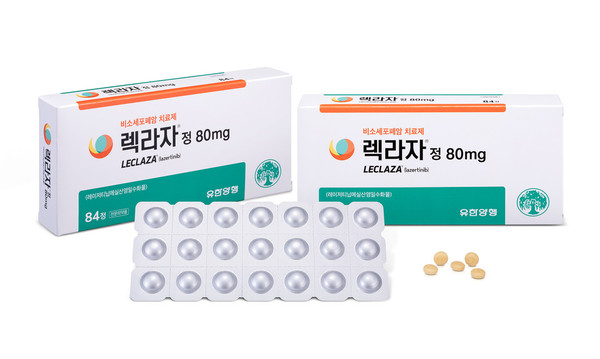Yuhan Corp.'s Leclaza (ingredient: lazertinib) has passed the Cancer Drugs Benefit Appraisal Committee, the first gateway to expanded reimbursement as a first-line treatment for patients with locally advanced or metastatic non-small cell lung cancer (NSCLC) with an epidermal growth factor receptor (EGFR) exon 19 deletion or exon 21 substitution mutation.

This announcement arrived just slightly past a two-month interval subsequent to the Ministry of Food and Drug Safety's approval of the drug's expanded indication as a first-line treatment in June.
Such swift progress is notable, especially considering the conventional timeline of four to five months that is customarily associated with the reimbursement approval process for cancer treatments.
For its competitor, AstraZeneca's Tagrisso, it took four years to pass the first gate of reimbursement.
Industry watchers have stressed that Leclaza's faster proceedings than Tagrisso is likely thanks to its homegrown status, as well as its generous support program.
Shortly after its approval as a first-line treatment, Yuhan unveiled an early access program (EAP) that provides free access to Leclaza, which costs 75 million won ($56,732) a year without reimbursement, for patients who receive Lecalaza as a first-line treatment.
AstraZeneca also has a program through the Korea Blood Disease & Cancer Association that covers a portion of the cost of Tagrisso for patients.
However, the program covers only 50 percent of the cost, according to lung cancer patients. Tagrisso, non-reimbursed, costs about 6 million won per month in Korea.
After passing the first stage of the reimbursement process, Leclaza will now have to go through the Economic Evaluation Subcommittee, Drug Reimbursement Evaluation Committee, negotiations with the Health Insurance Review and Assessment Service, a decision by the Health Insurance Policy Review Committee, and finally notification of the reimbursement standard.
While Tagrisso expanded its indication as first-line treatment of patients with locally advanced or metastatic NSCLC with EGFR exon 19 deletion or exon 21 (L858R) substitution mutation in 2018, AstraZeneca Korea has yet to receive reimbursement for Tagrisso.
At the 2019 Cancer Drugs Benefit Appraisal Committee meeting, which is when Tagrisso's first-line treatment reimbursement expansion was first on the agenda, it was deferred as the committee deemed that there was a lack of significant improvement in overall survival compared to standard of care.
While AstraZeneca repeated the process three more times from 2021 to 2022, the reimbursement standard was not set due to reasons such as clinical usefulness and cost-effectiveness.
Finally, in March of this year, the Cancer Drugs Benefit Appraisal Committee set Tagrisso's reimbursement standards.
According to AstraZenca's public relation (PR) agency, Tagrisso has also passed the Economic Evaluation Subcommittee and Risk Sharing Agreement Subcommittee last week and is set to be on the agenda for discussion during the Drug Reimbursement Evaluation Committee on Sep. 7.
As a result, industry watchers are closely watching whether Leclaza can catch up on Tagrisso's process and go through the reimbursement expansion process at the same time.
Related articles
- Leclaza shows benefits of homegrown new drug
- ‘Leclaza showed consistent global PFS results as 1st-line NSCLC treatment’
- Yuhan's Leclaza indication expanded as 1st-line NSCLC treatment
- 'We're seeing more weapons in the battle against lung cancer'
- Yuhan's Leclaza aims to enter US market based on MARIPOSA study’s success
- Yuhan’s lung cancer drug Leclaza takes first step into global market

